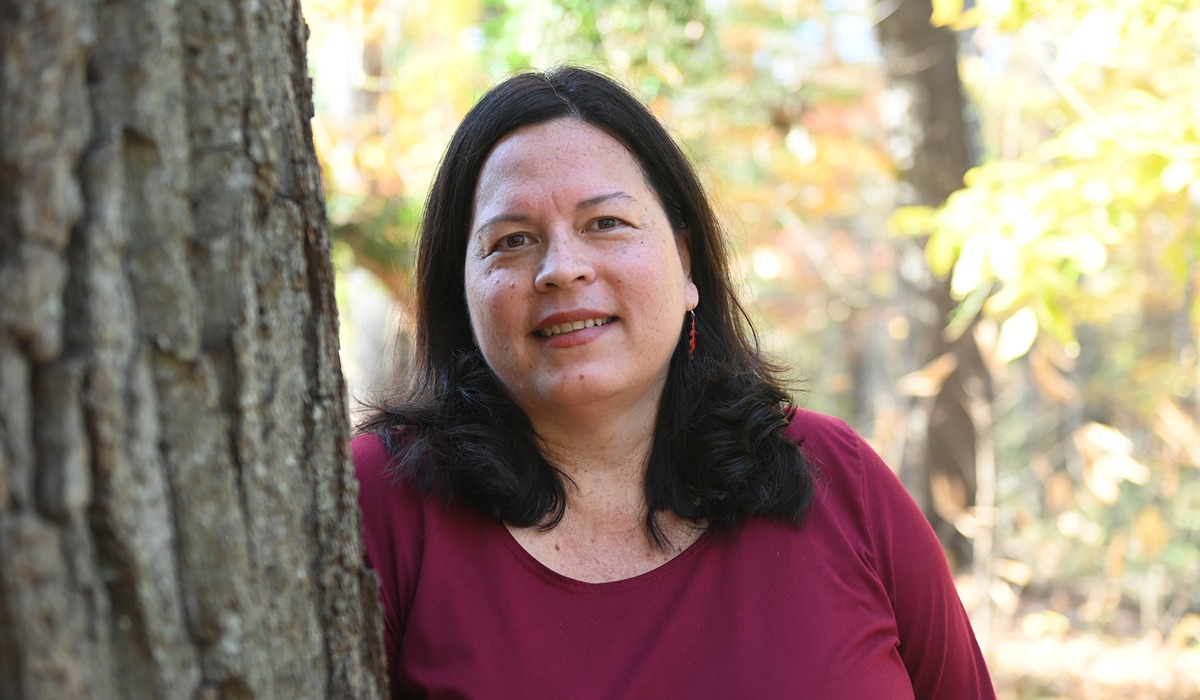November 13, 2023

Ana Ka’ahanui, B.A. 1993, is a dendrophile – a lover of trees. Sitting in front of the Edward J. Pryzbyla University Center on a warm November day she pointed out three ginkgos bearing brilliant lemon-yellow leaves. “They’re one of the most ancient trees we have,” she said. “I love gingkos. Do you have trees around where you live?”
This is what Ka’ahanui does best: connect others to nature and invite them to find an element of wonder and joy in their surroundings.
Ka’ahanui is a certified forest therapy guide and co-founder of Capital Nature, a nonprofit organization that brings nature into the lives of Washington metropolitan area residents and visitors.
In her work as a forest therapy guide, Ka’ahanui leads individuals several weekends a month through a mindfulness practice called “forest bathing,” which she explained is “based on the principle of slowing down and connecting with nature with all your senses.”
Forest bathing, or shinrin-yoku, originated in Japan in the 1980s to combat burnout, stress, and ill health effects in the workforce as a result of the tech boom.
In 2021, Washington Post columnist John Kelly accompanied Ka’ahanui on a forest bathing session in Oxon Run in Southeast D.C. “The forest talks. Ana was showing us how to listen,” he wrote.
Through what are called “invitations,” or prompts, Ka’ahanui guides participants in all types of weather to take in the environment and later reflect with the group if they choose. “Silence is very welcome,” she said.
“For me, it all started with a leaf,” Ka’ahanui said. In 2016, amid the tense political climate following the presidential election, Ka’ahanui found respite in learning about trees and started an Instagram campaign called “The Daily Leaf.” Friends, family, and colleagues commented on posts saying, “This makes me feel so good,” and some would even come up to her at work, hugging her in thanks.
Ka’ahanui then joined the Virginia master naturalist program, a volunteer corps that educates and provides service to manage natural resources and areas in their local communities. To earn her certification, she took classes and went on field trips to learn about birds, trees, bugs, and more, and completed 40 hours of community service.
She realized what truly excited her was “the notion of connecting people to nature because I knew of the benefits, both mental and physical.”
Over lunches with her friend Stella Tarnay, co-founder of Biophilic DC and a master naturalist, the two discussed how the Washington metro area had so much to offer but felt “siloed” in different groups like “the bird people” or “the plant people.”
They started Capital Nature in 2018 to connect people with the unique opportunities that the metro area offers, whether it be an activity they lead themselves like a tree identification walk or a citizen science walk, where individuals gather data and photos and enter the information on an app for scientific research.
Capital Nature’s website also hosts a curated monthly calendar that is a “one-stop shop” of local nature events.
On top of all this, Ka’ahanui works full time as a project manager and staff photographer at U.S. Green Building Council, where she recently celebrated her 20th work anniversary. But her dream is to one day solely pursue Capital Nature.
Reflecting on her time as a student at Catholic University studying French and Italian, Ka’ahanui said she received a well-rounded education, adding that her time on campus was “formative.”
Far away from her home state of Hawaii, Ka’ahanui said that Ingrid Merkel, M.A. 1963, Ph.D. 1966, the director of the University Honors Program, took her under her wing. Ka’ahanui especially appreciated Merkel’s goal to instill culture into honors students, recalling how Merkel brought them to the Kennedy Center for opera performances and took them on hikes in the Shenandoah Valley.
Ka’ahanui has taken students from D.C. universities forest bathing and said she would love to have Catholic University students take part in the experience. She’s also eager to have CatholicU students involved in the City Nature Challenge, a contest where cities compete to see who can make the most observations about nature through an app.
